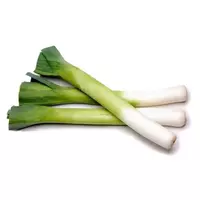Leek

The birthplace of leeks is the Mediterranean. Already from there it spread throughout Europe and in some areas of Africa. In our country, leeks are not so popular. It is cultivated mainly in southern Russia. Leek stems and young leaves are eaten. Leeks are added to a variety of dishes - soups, salads, etc. They also consume it as an independent snack in its fresh form. It would seem that this is not typical for onions, but leeks have a soft and pleasant taste, unlike the onions we are used to.
The benefits of leeks
Surpassing bulb onions in taste, leek is in no way inferior to it in useful properties. The properties of leek are due to its rich composition. Pore onions contain a significant amount of vitamin C. Surprisingly, it only increases over time, unlike most vegetables, which lose nutrients during storage. Leek is recommended to be stored for no more than six months.
The benefits of leeks are not limited to this. It also includes vitamins of group B. Sera, contained in pores, contributes to improving appetite, activates digestive processes, and has a beneficial effect on the functioning of the liver and gallbladder. The leek helps to cleanse the blood, increase the level of hemoglobin in it, improves and accelerates the hematopoietic process.
Leeks are used as a therapeutic and preventive agent for diseases such as rheumatism, gout and obesity. By the way, leeks are an excellent dietary product. The calorie content of leeks is only 36 kcal. 100 gr. Therefore, it can be safely included in the dietary diet, because leek perfectly eliminates hunger and quickly saturates the body.
In addition, the benefits of leeks have proven themselves in the prevention of various colds and infectious diseases. Leek strengthens the immune system, restores physical strength, raises life tone, which is especially important in the modern era of constant stress. This vegetable is recommended as an antiseptic, antimicrobial.
Leeks are thought to speed up wound healing. During spring vitamin infusion, leeks will simply be indispensable. It will perfectly restore the body weakened by the debilitating winter and colds, of course, for the best result, leek must be part of a balanced diet rich in a variety of vitamins and trace elements.
The harms of leeks
Speaking about the benefits, one cannot but say about the dangers of leeks. Contraindications to the use of this product are as follows: leeks should not be consumed by people suffering from peptic ulcers of the stomach and duodenum, especially during the exacerbation of these ailments. In all other cases, leeks will be extremely beneficial and enjoy their unforgettable taste.
leeks 36 kCal
Energy value of leeks (Ratio of proteins, fats, carbohydrates - ju):
Proteins: 2 g (~ 8 kCal)
Fats: 0.2 g (~ 2 kCal)
Carbohydrates: 6.3g (~ 25kCal)
Energy ratio (bj | y): 22% | 5% | 70%
 Español
Español Français
Français Português
Português Русский
Русский 简体中文
简体中文 繁體中文
繁體中文 日本語
日本語 한국어
한국어 العربية
العربية Türkçe
Türkçe Қазақ
Қазақ Deutsch
Deutsch Italiano
Italiano Українська
Українська
